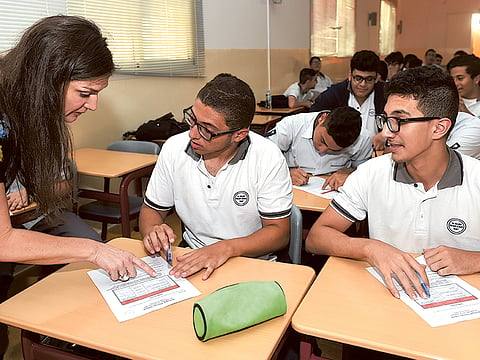1500 school teachers to be trained on moral education curriculum across the UAE
The courses are designed for teachers of all academic backgrounds, specialities

Abu Dhabi: The Education Affairs Office at the Crown Prince Court in Abu Dhabi has announced the launch of an interactive training programme for teachers designed to enhance the implementation of the Moral Education Curriculum across schools in the UAE.
The programme aims to train 1,500 teachers nationwide, and with the help of a number of partners and experts in the field, the program has already trained its first batch of 400 teachers.
The programme strives to enhance educational performance across the UAE, in line with the objectives of the Moral Education Curriculum, which was launched in 2016, under the guidance of His Highness Shaikh Mohammad Bin Zayed Al Nahyan, Crown Prince of Abu Dhabi and Deputy Supreme Commander of the UAE Armed Forces.
The courses are designed for teachers of all academic backgrounds, educational specialities and methodologies. Additionally, the training courses use an innovative approach that contributes to the development of teachers’ abilities and ways of communicating with students. Teachers will be able to enrich their teaching materials and communicate information to students in a smooth and fun way.
The Moral Education Curriculum, taught every day for 60 minutes to all students, is based on four pillars, namely: Character and Morality, The Individual and the Community, Civic Studies, and Cultural Studies. The curriculum is innovative and engaging, and it is designed to provide young students of all nationalities and ages with universal principles and values that reflect the shared experiences of humanity.
A Unique Initiative
Jameela bint Salem Al Muhairi, Minister of State for Public Education, said: “The Moral Education Curriculum initiative is a unique initiative that reflects our wise leadership’s vision to build Emirati identity on good values, ethics and behaviours, deepening the global and positive concept of citizenship.
“We have worked closely with the Abu Dhabi Crown Prince Court in developing the framework of this program, and are delighted to have already trained 400 teachers from public and private schools. Building a proper, responsible, balanced, tolerant, creative and interactive personality is one of the visions of the Ministry of Education, and the adoption of Moral Education Curriculum is only a step towards supporting this approach in a precise and promising manner.”
Recognition of Needs
Muhamed Al Nuaimi, Director of the Education Affairs Office at the Crown Prince Court in Abu Dhabi, said: “This training programme comes in response to the demands of teachers and the importance of training them to convey the right messages, and contribute towards building a generation based on firmly established values and ethics.”
He said the process of designing and developing the new training and professional programme is based on the feedback and suggestions of former teachers, with particular regard to meeting the requirements of current teachers to ensure an optimal application of the programme across all classes.
Al Anoud Al Kaabi, Project Manager at the Education Affairs Office at the Crown Prince Court, said: “Educational aspects and the national upbringing are of utmost importance. The religious, cultural values and national heritage that we seek to instill in future generation through this first-of-its-kind curriculum will help learners face future challenges and opportunities, that will help shape their prosperous futures. We hope that this curriculum will succeed in empowering young people and providing them with the necessary tools to succeed in building the future of the nation at all levels.”
The training will be delivered in-person and digitally, and its content and methodologies will address the diversity of the UAE, while providing teachers with the right tools for modifying and adapting examples and lessons in their classrooms to reach and engage all students.






